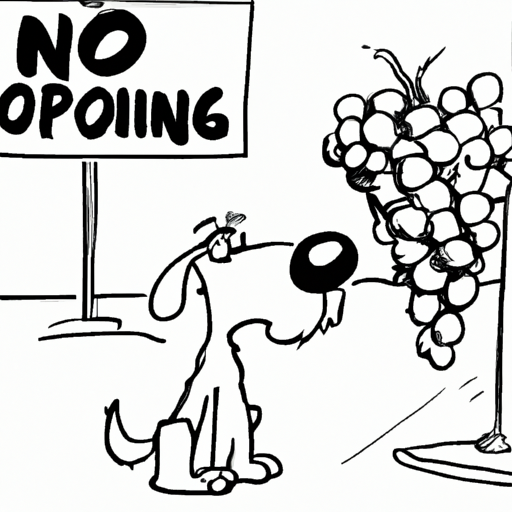Hello there, caring pet parent. This article is for you, the one who is always ready to go the extra mile for your furry friend. We are about to embark on a journey to understand why grapes – a seemingly harmless and nutritious fruit – can be harmful to our canine companions.
The Toxicity of Grapes
Grapes, and their dehydrated siblings, raisins, can cause severe health issues in dogs. Although the specific toxin in grapes that affects dogs is still unknown, researchers have confirmed that these fruits can lead to acute kidney failure in dogs. Symptoms of this condition can be subtle at first, but they can rapidly escalate.
- Early signs include vomiting and diarrhea, often within a few hours of ingestion. Your dog may also show signs of severe lethargy, dehydration, and loss of appetite.
- Advanced signs may include increased thirst and urine production, or the complete opposite — your dog may drink less water and produce less urine.
Why are Grapes More Toxic to Some Dogs Than Others?
The toxic effects of grapes and raisins vary widely among dogs. Some dogs may consume grapes without any effects while others may develop life-threatening conditions after eating just a few grapes. Factors contributing to this variability can include:
- Individual sensitivity or allergic reaction
- The dog’s size, age, health status, and genetic makeup
- The amount of grapes or raisins ingested
The Treatment for Grape and Raisin Ingestion
If you suspect that your dog has eaten grapes or raisins, act fast. The sooner the treatment begins, the better the chances of survival. Here’s what you need to do:
- Step 1: Call your vet immediately. They may instruct you to induce vomiting under their supervision.
- Step 2: Take your dog to the vet or an emergency animal hospital right away.
Your vet may induce vomiting if your dog ate the grapes recently. They might also use activated charcoal to absorb any remaining toxins. Your dog might need to be hospitalized and given intravenous fluids for about 48 hours.
Preventing Grape and Raisin Toxicity in Dogs
Prevention is always better than cure. Here are a few steps you can take to protect your dog from the dangers of grapes:
- Keep grapes and raisins out of reach.
- Educate children about the dangers of feeding grapes to dogs.
- Check ingredient lists on food and treats to ensure they don’t contain grapes or raisins.
| Do | Don’t |
|---|---|
| Keep grapes out of reach | Leave fruit bowls within reach |
| Read food labels | Assume all foods are safe |
| Seek immediate veterinary care if ingestion occurs | Wait to see if symptoms develop |
FAQ
Q: Can a single grape kill a dog?
A: It’s possible, especially for a small dog. The toxic dose varies widely between individual dogs.
Q: What should I do if my dog eats a grape?
A: Call a vet immediately. They may instruct you to induce vomiting.
Q: Are all types of grapes toxic to dogs?
A: Yes, all types of grapes and raisins are toxic to dogs.
Q: Is there an antidote for grape poisoning in dogs?
A: There’s no antidote, but vets can provide supportive care to help the kidneys.
This information is shared with love and concern for the wellbeing of your furry family member. Remember, when it comes to your pet’s health, no question is too small or silly. Always consult with your vet if you’re unsure about something. They are there to help.



